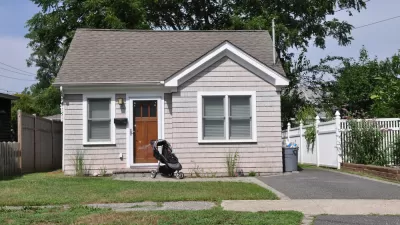Several Dutch cities are planning to limit the reach of large investors in the housing market by limiting the resale of cheap or mid-priced homes.

An article for DutchNews.nl reports on the growing number of local governments in the Netherlands preparing to crackdown on the number of private investors buying up large numbers of cheap and mid-price housing in the country's largest cities.
"A third of all houses sold in the four big cities last year ended up in the hands of developers, prompting first-time buyers to take greater financial risks or preventing them to get onto the housing ladder at all," according to the article.
According to a recent survey [Dutch language] of ten local governments, many cities will take advantage of a new rule that will prohibit the resale of a cheap or mid-priced homes for four years. Some of the cities responding to the survey said they plan to ban developers altogether.
"Local councils will have to justify a ban by showing that the lack of cheap and mid-priced homes in some neighbourhoods is distorting the market and is therefore ‘necessary and effective’," according to the article.
Large private investors are also increasing their footprint in many housing markets in North America, prompting a variety of policy responses.
Some cities and provincial governments in Canada have proposed taxes to "non-resident speculation" to slow the spread of large investments in the housing market. In the United States, community ownership and "opportunity to purchase" acts are proposed as mitigation measures.
Policy approaches to keep distressed real estate assets out of the hands of large private investors are in speculative or experimental stages in the U.S. Senator Elizabeth Warren (D-Mass.) first proposed the American Housing and Economic Mobility Act in 2019—the law is still under consideration in the U.S. Senate—to require the Federal Housing Administration to ensure that not less than 75 percent of the single-family residential properties conveyed to the Federal Housing Administration after foreclosure are sold to owner-occupants or "community partners." California's SB 1079, proposed by Democratic State Senator Nancy Skinner and signed into law in September 2020, modified the foreclosure auction process to reduce the advantage big corporations had that allowed them to bulk-purchase many homes at a single auction.
In addition to the links in the previous paragraph, Planetizen frequently publishes articles on the "financialization" of housing, including articles from 2019 and 2021 that provide an introduction to the subject.
FULL STORY: Cities plan to use new law to block investors from housing market

Study: Maui’s Plan to Convert Vacation Rentals to Long-Term Housing Could Cause Nearly $1 Billion Economic Loss
The plan would reduce visitor accommodation by 25,% resulting in 1,900 jobs lost.

North Texas Transit Leaders Tout Benefits of TOD for Growing Region
At a summit focused on transit-oriented development, policymakers discussed how North Texas’ expanded light rail system can serve as a tool for economic growth.

Why Should We Subsidize Public Transportation?
Many public transit agencies face financial stress due to rising costs, declining fare revenue, and declining subsidies. Transit advocates must provide a strong business case for increasing public transit funding.

How to Make US Trains Faster
Changes to boarding platforms and a switch to electric trains could improve U.S. passenger rail service without the added cost of high-speed rail.

Columbia’s Revitalized ‘Loop’ Is a Hub for Local Entrepreneurs
A focus on small businesses is helping a commercial corridor in Columbia, Missouri thrive.

Invasive Insect Threatens Minnesota’s Ash Forests
The Emerald Ash Borer is a rapidly spreading invasive pest threatening Minnesota’s ash trees, and homeowners are encouraged to plant diverse replacement species, avoid moving ash firewood, and monitor for signs of infestation.
Urban Design for Planners 1: Software Tools
This six-course series explores essential urban design concepts using open source software and equips planners with the tools they need to participate fully in the urban design process.
Planning for Universal Design
Learn the tools for implementing Universal Design in planning regulations.
City of Santa Clarita
Ascent Environmental
Institute for Housing and Urban Development Studies (IHS)
City of Grandview
Harvard GSD Executive Education
Toledo-Lucas County Plan Commissions
Salt Lake City
NYU Wagner Graduate School of Public Service





























